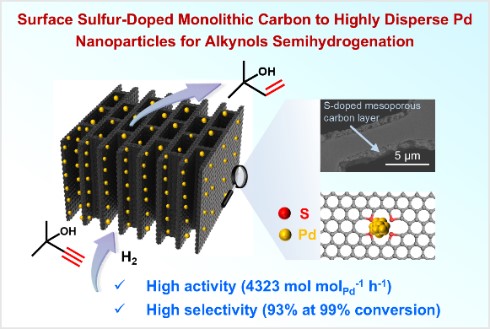Pd supported on surface sulfur-doped mesoporous monolithic carbon to boost semihydrogenation of alkynols

Abstract
Pd-catalyzed semihydrogenation of alkynols to enols is a pivotal industrial process for synthesizing fine chemicals like fragrances and vitamins. The selection of carbon-based supports is crucial due to their advantages in good chemical and thermal stability, tunable surface properties, and facile metal recovery via combustion. Herein, we constructed the wood-based monolithic carbon support with a sulfur-doped mesoporous carbon layer to anchor high-dispersed Pd nanoparticles. This mesoporous carbon layer was fabricated via co-polymerization of 2-thiophenemethanol and tetraethoxysilane monomers formed by decomposition of the tetrakis(2-thiophenemethoxy)silane on wood substrates, followed by pyrolysis and removal of silica. The resultant Pd/C catalyst exhibited high catalytic activity (4323 mol molPd-1 h-1) and selectivity (93% at 99% conversion) under mild conditions (298 K, 2 bar H2) in 2-methyl-3-butyn-2-ol (MBY) semihydrogenation. The thiophene-like sulfur and mesoporous framework synergistically promoted Pd dispersion, thereby boosting catalytic activity. Meanwhile, the electron-rich Pd0 sites, which originated from electron donation of thiophene-like sulfur species, significantly enhanced catalytic selectivity. Additionally, the sulfur-modified monolithic catalyst presented good stability over five cycles and facile separation from the solution. It also displayed broad applicability in diverse alkynol semihydrogenation reactions, demonstrating high potential for liquid-phase catalytic applications.

